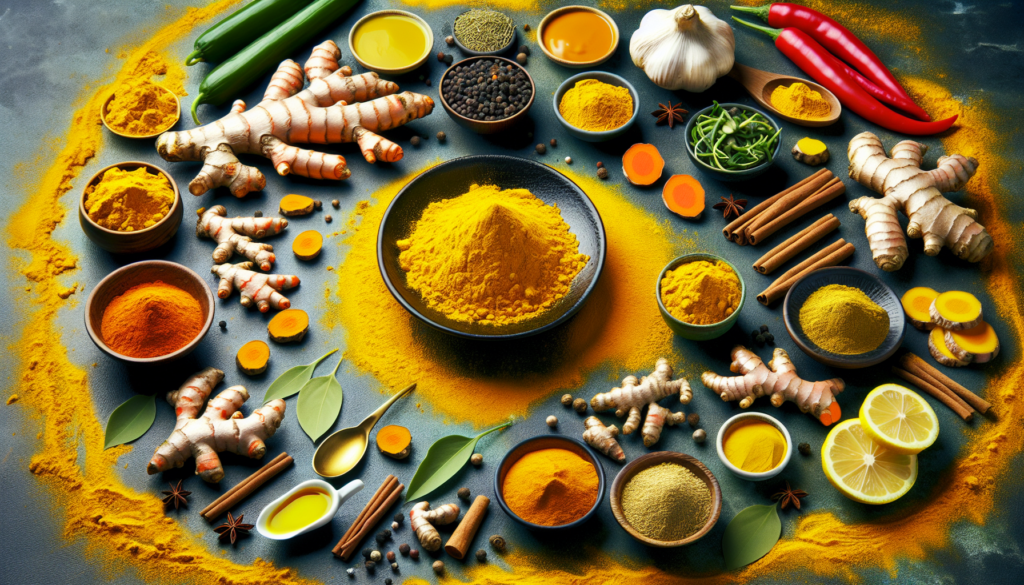Hey, we all know turmeric has been gaining quite the popularity lately, showing up in all sorts of recipes and health-conscious food products. But have you ever wondered if all the hype around turmeric is actually worth it? I mean, is turmeric in food really good for you? Well, let’s uncover the truth and find out if this vibrant spice deserves a spot in your daily diet.
Key Takeaways
-
Turmeric has a rich history and is commonly used in Ayurvedic medicine.
-
It contains the compound curcumin, which has anti-inflammatory and antioxidant properties.
-
Turmeric can reduce inflammation, support brain health, and improve cognitive function.
-
It promotes digestion, supports gut health, and aids in nutrient absorption.

Can turmeric in food benefit your health?
Turmeric has gained significant attention in recent years for its potential health benefits. This golden spice, commonly used in Indian and Southeast Asian cuisine, contains a compound called curcumin, which is believed to be the source of its therapeutic properties. In this article, we will explore the various ways in which turmeric, specifically curcumin, can positively impact your health and whether cooking turmeric affects its health benefits.
Turmeric’s active compound: Curcumin
Curcumin is the active compound in turmeric that has been studied for its potential health benefits. It is a powerful antioxidant and is known for its anti-inflammatory properties. These properties make curcumin a promising candidate for a wide range of health conditions.
Curcumin’s health benefits
One of the key benefits of curcumin is its anti-inflammatory properties. Inflammation is a natural response by the body to injury or infection, but chronic inflammation can lead to a host of health problems. Curcumin has been shown to help reduce inflammation in the body, which can be beneficial for managing chronic conditions such as arthritis and inflammatory bowel disease.
In addition to its anti-inflammatory properties, curcumin has also been found to have potential anti-cancer properties. Studies have shown that curcumin may help prevent the growth and spread of cancer cells, though more research is needed to fully understand its potential in cancer prevention and treatment.
Does cooking turmeric affect its health benefits?
Cooking turmeric can affect the bioavailability of curcumin, meaning that the body may not absorb it as effectively. However, combining turmeric with black pepper can enhance the absorption of curcumin, thanks to the presence of piperine in black pepper. Additionally, cooking turmeric with oils or fats can also improve the absorption of curcumin into the body. So, while cooking turmeric may reduce the overall amount of curcumin available, there are ways to optimize its absorption and still reap its health benefits.
Potential side effects of turmeric
While turmeric is generally safe for consumption, some people may experience side effects. These can include gastrointestinal issues such as diarrhea or nausea, as well as allergic reactions in some individuals. It is also important to note that turmeric may interact with certain medications, so it is advisable to consult with a healthcare professional before adding turmeric supplements to your routine.
Allergies to turmeric are rare but can manifest as skin rashes, hives, or even difficulty breathing. If you have a known allergy to ginger, yellow food coloring, or other spices in the same family as turmeric, it’s advisable to avoid turmeric altogether.
Additionally, turmeric has been reported to cause skin irritation when applied topically. It’s always recommended to do a patch test before using turmeric on your skin to check for any adverse reactions.
Anti-inflammatory properties of turmeric
Reducing inflammation in the body
Chronic inflammation is a common underlying factor in many diseases, including heart disease, diabetes, and even certain types of cancer. Turmeric, with its anti-inflammatory properties, can help to reduce inflammation in the body. Curcumin inhibits the action of molecules that trigger inflammation, thus potentially providing relief for those suffering from conditions like arthritis and inflammatory bowel disease.
Managing chronic conditions
Conditions like rheumatoid arthritis and osteoarthritis can cause significant pain and discomfort. Turmeric has been studied for its potential to alleviate the symptoms of these chronic conditions. Research suggests that curcumin can help to reduce joint pain and swelling, leading to improved mobility and quality of life.
Preventing cancer
The potential anti-cancer properties of turmeric have attracted considerable attention from researchers. Studies have shown that curcumin may inhibit the growth and spread of cancer cells in various types of cancer, including breast, lung, and colorectal cancer. While more research is needed, these findings suggest that incorporating turmeric into your diet may have potential cancer-fighting benefits.
Turmeric’s role in digestion
Improving digestion
Turmeric has long been used in traditional medicine as a digestive aid. It stimulates the production of digestive enzymes, which can help to improve digestion and alleviate symptoms such as bloating and indigestion. Adding turmeric to your meals or consuming it as a tea may help promote better digestion.
Relieving gastrointestinal discomfort
In addition to improving digestion, turmeric may also help to alleviate gastrointestinal discomfort. It has been used as a natural remedy for conditions like irritable bowel syndrome (IBS) and ulcerative colitis. The anti-inflammatory properties of turmeric can help reduce inflammation in the gut, providing relief for those suffering from these conditions.
Effects of turmeric on liver health
Supporting liver function
Your liver is responsible for detoxifying your body and processing various toxins. Turmeric can support liver health by enhancing the production of enzymes that aid in detoxification. By supporting your liver’s function, turmeric can assist in maintaining overall health and well-being.
Promoting detoxification
Detoxification is a natural process that eliminates toxins from the body. Turmeric aids in this process by increasing the production of liver enzymes responsible for breaking down toxins. Regular consumption of turmeric may help support your body’s natural detoxification mechanisms and promote a healthier liver.

Potential benefits for heart health
Reducing cholesterol levels
High cholesterol levels can increase the risk of heart disease. Turmeric has been studied for its potential to reduce cholesterol levels by enhancing the metabolism of cholesterol in the liver. By lowering cholesterol levels, turmeric may help to protect against heart disease and maintain cardiovascular health.
Lowering blood pressure
High blood pressure is a significant risk factor for heart disease and stroke. Studies have shown that curcumin may help to lower blood pressure by promoting the dilation of blood vessels. Incorporating turmeric into your diet may have a positive impact on blood pressure levels and contribute to better heart health.
Preventing blood clotting
Blood clotting is essential for wound healing, but excessive clotting can lead to serious health problems, such as heart attacks and strokes. Turmeric has been found to possess antiplatelet properties, which means it can help prevent excessive blood clotting. By reducing the risk of abnormal blood clot formation, turmeric may contribute to better heart health.
Impact on brain health and cognitive function
Protecting against neurodegenerative diseases
Neurodegenerative diseases like Alzheimer’s and Parkinson’s are characterized by the loss of brain cells and impaired cognitive function. Curcumin’s antioxidant and anti-inflammatory properties have shown promise in protecting against these diseases. Studies have indicated that curcumin may help clear away plaque in the brain and reduce inflammation, potentially slowing down the progression of neurodegenerative diseases.
Enhancing memory and concentration
In addition to its potential protective effects against neurodegenerative diseases, turmeric may also have a positive impact on memory and cognitive function. Research has suggested that curcumin may enhance memory and attention span, while also improving overall brain function. Incorporating turmeric into your diet may be a natural way to support brain health and cognitive function.
Role in managing weight and metabolism
Assisting with weight loss efforts
Maintaining a healthy weight is essential for overall well-being. Turmeric may aid in weight loss by boosting metabolism and increasing fat burning. Studies have shown that curcumin can help reduce body weight and body fat, making it a potentially beneficial addition to a healthy weight loss regimen.
Regulating metabolism
A properly functioning metabolism is crucial for maintaining a healthy weight and overall health. Turmeric has been found to have a positive impact on metabolism by increasing the production of enzymes that regulate metabolism. By aiding in metabolic regulation, turmeric can support weight management and promote better overall health.
Turmeric’s effects on skin health
Improving skin conditions
Skin conditions like acne, eczema, and psoriasis can cause discomfort and affect self-esteem. Turmeric’s anti-inflammatory properties can be beneficial in managing these skin conditions. Applying turmeric topically or consuming it can help to reduce inflammation and soothe irritated skin, potentially improving the appearance and overall health of the skin.
Reducing signs of aging
The antioxidants found in turmeric can help to combat free radicals, which contribute to premature aging. By neutralizing these free radicals, turmeric may help reduce the appearance of wrinkles, fine lines, and other signs of aging. Regular consumption of turmeric or using turmeric-based skincare products may promote a youthful complexion and healthier-looking skin.
Potential benefits for joint and bone health
Alleviating arthritis symptoms
Turmeric’s anti-inflammatory properties make it a potential natural remedy for alleviating arthritis symptoms. Studies have shown that curcumin can help reduce joint pain, swelling, and stiffness associated with arthritis. Regular consumption of turmeric may provide relief and improve joint function in individuals with arthritis.
Supporting bone strength
Maintaining strong and healthy bones is crucial for overall mobility and quality of life. Turmeric may play a role in supporting bone strength, as studies have indicated that curcumin may help increase bone density. By incorporating turmeric into your diet, you may be able to promote better bone health and reduce the risk of conditions like osteoporosis.
Using turmeric in cooking
Ways to incorporate turmeric in your diet
There are numerous ways to incorporate turmeric into your diet. You can add it to curries, stir-fries, soups, or even sprinkle it on roasted vegetables for an added burst of flavor. Turmeric can also be used to make golden milk, a popular beverage in Ayurvedic medicine. Additionally, you can find turmeric supplements if you prefer a more concentrated form.
To enhance the nutritional value of your meals, consider incorporating the vibrant spice turmeric into your daily cooking routine. Turmeric not only adds a delightful flavor and vibrant color to your dishes, but it also offers numerous health benefits.
Here are four ways you can easily incorporate turmeric into your diet:
- Start your day with a golden latte: Turmeric lattes have gained popularity in recent years, and for good reason. Simply mix turmeric powder with warm milk, a dash of black pepper, and a natural sweetener like honey or maple syrup. This soothing beverage isn’t only delicious but also a great way to kickstart your day with the goodness of turmeric.
- Spice up your meals: Add a pinch of turmeric powder to your curries, stir-fries, soups, and stews. It pairs well with a variety of ingredients and adds a warm, earthy flavor to your dishes.
- Try turmeric rice or quinoa: Cook your favorite grains with a teaspoon of turmeric powder to infuse them with its vibrant color and subtle flavor. Turmeric rice or quinoa makes for a visually appealing side dish that complements a variety of main courses.
- Experiment with turmeric smoothies: Blend turmeric powder with your favorite fruits, vegetables, and a liquid of your choice to create a nutritious and refreshing smoothie. Turmeric’s earthy taste blends well with ingredients like bananas, pineapples, spinach, and coconut milk.
Golden Latte
Turmeric Infused Golden Elixir
- 1 cup almond milk
- 1 teaspoon ground turmeric
- 1/2 teaspoon ground cinnamon
- 1/4 teaspoon ground ginger
- 1 tablespoon honey or maple syrup
- 1/2 teaspoon vanilla extract
- Pinch of black pepper
- In a small saucepan, heat the almond milk over medium heat until warmed but not boiling.
- Whisk in the turmeric, cinnamon, ginger, honey or maple syrup, vanilla extract, and a pinch of black pepper.
- Continue to whisk until the mixture is well combined and heated through. Be careful not to boil.
- Pour the golden latte into your favorite mug and enjoy!
Remember, while turmeric supplements are available, it’s always best to obtain nutrients from whole foods whenever possible.
Recommended daily intake of turmeric
The recommended daily intake of turmeric varies depending on factors such as age, overall health, and individual needs. However, a common guideline is to aim for about 1-3 grams of turmeric per day, which can be achieved through culinary use or supplementation. It is important to note that if you are considering taking turmeric supplements, it is recommended to consult with a healthcare professional to determine the appropriate dosage for you.
Frequently Asked Questions
Can Turmeric Be Used as a Natural Remedy for Arthritis?
Using turmeric as a natural remedy for arthritis is a potential option. Its effectiveness in treating arthritis and its ability to relieve joint inflammation make it a promising natural pain reliever.
Are There Any Side Effects of Consuming Turmeric on a Regular Basis?
Regular consumption of turmeric may have potential risks and side effects. It is important to be aware of these before incorporating it into your daily diet.
Does Turmeric Help in Reducing the Risk of Chronic Diseases Like Heart Disease and Cancer?
Turmeric in food can reduce the risk of chronic diseases like heart disease and cancer. It also aids in weight loss and supports brain health. Enjoy the freedom to improve your well-being with this powerful spice.
Can Turmeric Be Used to Treat Depression and Anxiety?
Turmeric for mental health can be an alternative treatment. It may help with depression and anxiety. Research suggests that the active compound in turmeric, curcumin, may have potential benefits for your mental well-being.
Is It Safe to Consume Turmeric During Pregnancy and Breastfeeding?
During pregnancy and breastfeeding, it is generally safe to consume turmeric in food. However, it is important to consult with your healthcare provider to ensure it won’t interfere with any specific conditions or medications.
In conclusion, turmeric, specifically its active compound curcumin, offers a wide range of potential health benefits. From its anti-inflammatory properties to its impact on brain health, digestion, and even skin health, turmeric can be a valuable addition to your diet. Whether you choose to incorporate it into your meals or opt for supplements, turmeric’s therapeutic properties may enhance your overall well-being. Just remember to consult with a healthcare professional, especially if you have any underlying health conditions or are taking medications, to ensure it is safe and appropriate for you.






